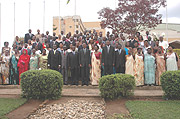The sixth annual national leadership retreat, organised by the Office of the President in conjunction with the Prime Minister’s office, which brings together approximately 200 invitees, including ministers, ambassadors and heads of government agencies, and chaired by the President himself has begun on this Monday at the Kivu Serena.


The sixth annual national leadership retreat, organised by the Office of the President in conjunction with the Prime Minister’s office, which brings together approximately 200 invitees, including ministers, ambassadors and heads of government agencies, and chaired by the President himself has begun on this Monday at the Kivu Serena.
While it’s been a noteworthy yearly event, I’ve been particularly interested in this year’s theme, "Beyond Aid: Mindset for Delivery and Development”; the main aim is to discuss strategies that can unblock the key barriers to development in order to enable Rwanda to escape aid dependency.
Aid dependency is the scourge of any proud nation. The mere fact that more than fifty percent of our national development budget is covered courtesy of foreign donations isn’t only embarrassing but also a dangerous situation strategically.
One particular incident brought this fact home; when a certain East African leader wanted to increase defence spending, he had to go, cap in hand, to London to ask permission from the Secretary of Overseas Development to do just that.
That incident brought home just how dependent our so-called ‘sovereign states’ really were to their western paymasters.
Whether the said head of state got the green light or not is a moot point-the mere fact that a ‘full’ president had to go to see a mere minister [ couldn’t even get access to the prime minister instead- I mean, if your going to beg, better see the head honcho] was an unbearable insult to him.
Many African nations have made the strategic choice to enjoy the fruits of other peoples labour rather than carrying their own burden.
As the Resident Fellow of the American Enterprise Institute for Public Policy Research ,Mauro De Lorenzo, wrote in a piece titled ‘The Rwandan Paradox’, "aid dependence tends to reduce the incentive of governments to increase their tax base and make it easier to do business, because it is simpler to increase revenues by competing for aid transfers”.
It pleases me, a proud Rwandan, that my Government is trying to get out of this aid trap. However, it won’t be a simple endeavour because of this undeniable reality- if we have to turn off the donor tap we’ll have to search for another tap to balance our books with.
So, here are the three alternatives as I see. Increased taxation, less government expenditure and lastly, keeping the taxes steady but increasing the taxable base. If I’ve missed an alternative, I apologise; I’ll be the first to admit that I’m not a development expert.
Let’s look at whether increasing taxes should be the silver bullet used in our situation. At the present moment I believe that Rwanda’s present taxpayers are currently being stretched as far as they should.
Taxes shouldn’t be so backbreaking that illegal tax evasion becomes a better alternative than actually doing the right thing. Therefore, I believe that the tax regime shouldn’t be increased at all- in fact I personally feel that it should be lowered.
The second alternative would be to reduce government expenditure. The government has attempted to do so in the past [who can’t remember the ‘traumatic’ time that civil servants had as they were shepherded out of their government homes and lost their keys of the ‘personal’ gas guzzler] and this is something to be positive about; however in a situation like ours where the state is such an overwhelming, and necessary facet of everyday life, the kind of immediate cut in government expenditure that would make foreign aid a thing of yesteryear would cause a distressful reaction.
With the pubic sector the true driver of the economy because the private is still in its infancy, any serious cut in public spending would seriously affect all the economic indicators, Gross Domestic Product, Gross National Product, per capita income and the inflation rate. So, the option of drastically cutting government expenditure is a no go.
Therefore, it leaves only one alternative that those in the national leadership retreat should be discussing; how to increase the tax base without necessarily increasing taxes. Well, it sounds easy in a nutshell, but increasing the tax base isn’t as easy as it sounds.
What will be needed will be increased economic activity [more firms, factories and more large-scale agriculture] and an increasingly monetised economy.
Until we can get the large majority of Rwandans at work, earning cash, and leaving their subsistence living, the idea that there will be lager tax base will remain just that: an idea.
But as I know quite well, diagnosing a problem and finding a cure are tow different things-it up to our leaders in Gisenyi to figure this one out.
Contact: sunnyntayombya@newtimes.co.rw


